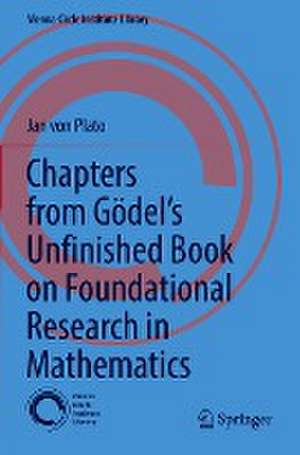Chapters from Gödel’s Unfinished Book on Foundational Research in Mathematics: Vienna Circle Institute Library, cartea 6
Autor Jan von Platoen Limba Engleză Paperback – 8 mai 2023
This book is a testimony to Gödel's understanding of the situation of foundational research in mathematics after his great discovery, the incompleteness theorem of 1931. It is also a source for his views on his logical predecessors, from Leibniz, Frege, and Russell to his own times. Gödel's "own book on foundations," as he called it, is essential reading for logicians and philosophers interested in foundations. Furthermore, it opens a new chapter to the life and achievement of one of the icons of 20th century science and philosophy.
| Toate formatele și edițiile | Preț | Express |
|---|---|---|
| Paperback (1) | 693.39 lei 6-8 săpt. | |
| Springer International Publishing – 8 mai 2023 | 693.39 lei 6-8 săpt. | |
| Hardback (1) | 699.59 lei 6-8 săpt. | |
| Springer International Publishing – 7 mai 2022 | 699.59 lei 6-8 săpt. |
Preț: 693.39 lei
Preț vechi: 815.75 lei
-15% Nou
Puncte Express: 1040
Preț estimativ în valută:
132.68€ • 138.53$ • 109.81£
132.68€ • 138.53$ • 109.81£
Carte tipărită la comandă
Livrare economică 04-18 aprilie
Preluare comenzi: 021 569.72.76
Specificații
ISBN-13: 9783030971366
ISBN-10: 3030971368
Ilustrații: IX, 214 p. 1 illus.
Dimensiuni: 155 x 235 mm
Greutate: 0.32 kg
Ediția:1st ed. 2022
Editura: Springer International Publishing
Colecția Springer
Seria Vienna Circle Institute Library
Locul publicării:Cham, Switzerland
ISBN-10: 3030971368
Ilustrații: IX, 214 p. 1 illus.
Dimensiuni: 155 x 235 mm
Greutate: 0.32 kg
Ediția:1st ed. 2022
Editura: Springer International Publishing
Colecția Springer
Seria Vienna Circle Institute Library
Locul publicării:Cham, Switzerland
Cuprins
Preface.- Dedication.- Part I: Gödel’s “Own Book on Foundations”.- Chapter 1. A Gödel puzzle.- Chapter 2. The Ergebnisse book project.- Chapter 3. Gödel’s reading of the logical literature.- Chapter 4. Gödel’s manuscript for the Ergebnisse book series.- Part II: Own Book (Foundations).- Chapter 5. Introduction.- Chapter 6. Logicism.- Chapter 7. Antinomies.- Chapter 8. Clear version, from the beginning to the antinomies.- Chapter 9. The epistemological standpoint of the logicists.- Chapter 10. Logical calculus.- Chapter 11. Metamathematics.- Chapter 12. General metamathematics (Princeton).- Part III: Gödel’s Reading Notes.- Chapter 13. Editorial remarks.- Chapter 14. The untitled notebook.- Chapter 15. The Altes Excerptenheft.- References.- Index.
Recenzii
“The volume closes with a cumulative bibliography, and indices of names mentioned
in the book chapters and in the excerpts. This is a valuable edition providing a comprehensive overview on the foundational debates of the early 20th century … .” (Volker Peckhaus, Mathematical Reviews, January, 2024)
in the book chapters and in the excerpts. This is a valuable edition providing a comprehensive overview on the foundational debates of the early 20th century … .” (Volker Peckhaus, Mathematical Reviews, January, 2024)
Notă biografică
Viennese logician Kurt Gödel (1906-1978) became world-famous overnight with his incompleteness theorems of 1931. The first one states the impossibility to represent all of mathematics in one closed system, the second that there is no ultimate guarantee that such systems could not lead to contradictions. Soon after the publication of Gödel's sensational article, he was invited to write, together with Arend Heyting, a concise book about the status of foundational research in mathematics. With Gödel prolonging the delivery of his part, Heyting lost patience and published his part in 1934. It has been generally believed that Gödel had made little headway with his chapters. A search in the Gödel papers showed the contrary to be the case: he had meticulously listed well over a hundred works to study and had practically finished two chapters in his Gabelsberger shorthand, and outlined a third.
Jan von Plato is professor of philosophy at the University of Helsinki. His books include Saved From the Cellar (Springer, 2017), Can Mathematics Be Proved Consistent? (Springer, 2020) and Kurt Gödel: The Princeton Lectures on Intuitionism (Edited by Maria Hämeen-Anttila and Jan von Plato, Springer 2021).
Jan von Plato is professor of philosophy at the University of Helsinki. His books include Saved From the Cellar (Springer, 2017), Can Mathematics Be Proved Consistent? (Springer, 2020) and Kurt Gödel: The Princeton Lectures on Intuitionism (Edited by Maria Hämeen-Anttila and Jan von Plato, Springer 2021).
Textul de pe ultima copertă
This volume contains English translations of Gödel's chapters on logicism and the antinomies and on the calculi of pure logic, as well as outlines for a chapter on metamathematics. It also comprises most of his reading notes.
This book is a testimony to Gödel's understanding of the situation of foundational research in mathematics after his great discovery, the incompleteness theorem of 1931. It is also a source for his views on his logical predecessors, from Leibniz, Frege, and Russell to his own times. Gödel's "own book on foundations," as he called it, is essential reading for logicians and philosophers interested in foundations. Furthermore, it opens a new chapter to the life and achievement of one of the icons of 20th century science and philosophy.
This book is a testimony to Gödel's understanding of the situation of foundational research in mathematics after his great discovery, the incompleteness theorem of 1931. It is also a source for his views on his logical predecessors, from Leibniz, Frege, and Russell to his own times. Gödel's "own book on foundations," as he called it, is essential reading for logicians and philosophers interested in foundations. Furthermore, it opens a new chapter to the life and achievement of one of the icons of 20th century science and philosophy.
Caracteristici
Based on the recent discovery of Gödel's work on an ``own book on foundations,'' completely unknown so far Reconstruction of Gödel's unpublished work by one of the leading Gödel experts in the scientific community A milestone in Gödel research and in the related foundational debate









